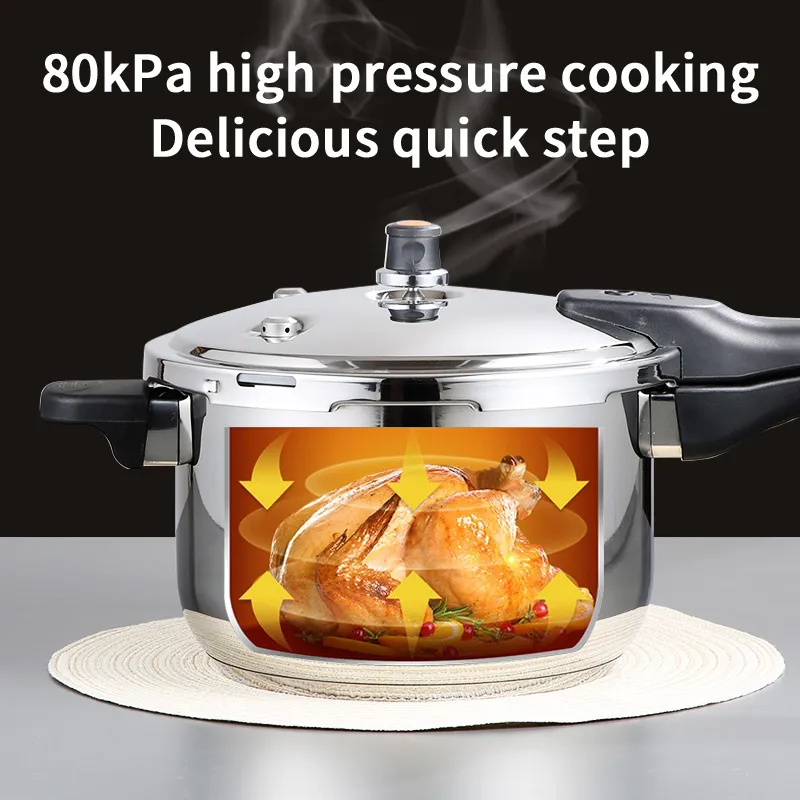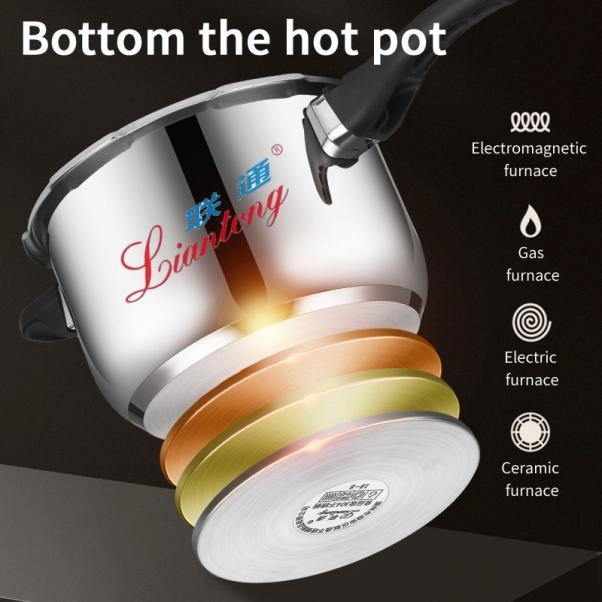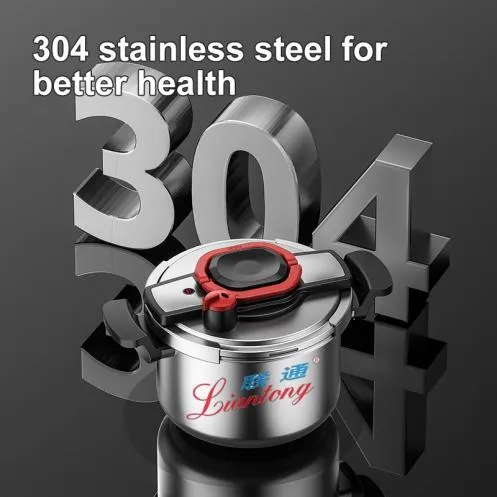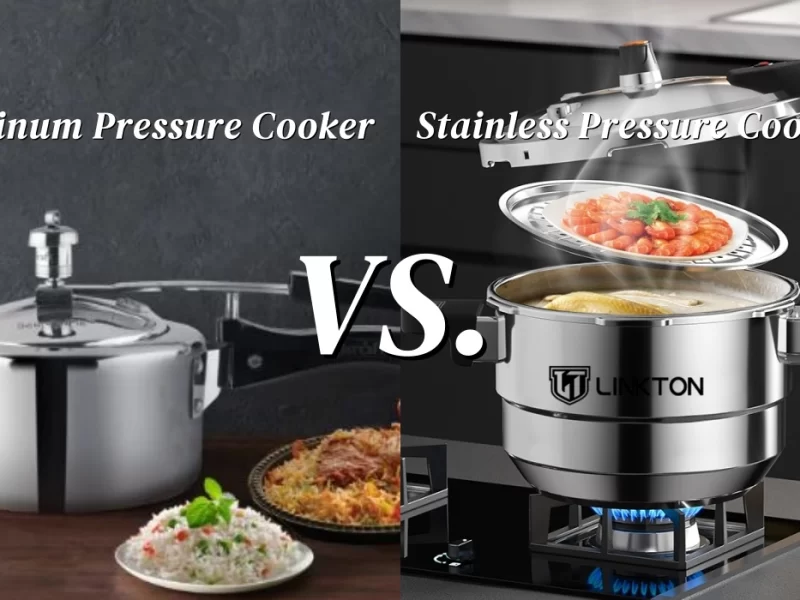
Aluminum and stainless steel pressure cookers are both common choices on the market, but they differ greatly in safety, durability, and cost. Stainless steel pressure cooker is increasingly becoming the first choice due to its comprehensive advantages. As a professional stainless steel pressure cooker manufacturer, we will compare the two materials across four dimensions—safety, durability, health benefits, and cost-effectiveness,to help you make an informed decision.
Safety: Which Material is More Reliable?
Aluminum Alloy Pressure Cooker:
- Lower Material Strength: Aluminum is softer and prone to deformation or wear under prolonged high pressure, compromising sealing integrity and increasing safety risks.
- Oxidation and Corrosion: Aluminum oxidizes in humid or acidic environments, potentially contaminating food. Damaged coatings may expose food to aluminum ions.
- Overheating Risks: Aluminum’s rapid heat conductivity can cause localized overheating, leading to burnt food or sudden pressure spikes.
Stainless Steel Pressure Cooker:
- Superior Pressure Resistance: Food-grade 304 stainless steel withstands higher pressures (e.g., 80kPa+) and resists deformation, ensuring long-term sealing performance.
- Multi-Layered Safety Systems: High-quality stainless steel models often include pressure valves, safety valves, and emergency vents. For instance, certain brands utilize patented elastic clamping beams to auto-release excess pressure, eliminating explosion risks.
- Corrosion Resistance: Stainless steel resists rust and acid corrosion, even when cooking tomatoes, vinegar, or other acidic ingredients.
Conclusion: Stainless steel pressure cookers excel in structural strength and safety features, ideal for households prioritizing zero-risk cooking.
Durability: Which Offers Better Long-Term Value?
Aluminum Pressure Cooker:
Average lifespan: 5-8 years. Although aluminum pressure cookers have good thermal conductivity and fast heating speed, they are less durable. Aluminum is soft and easily scratched or deformed by external impact or improper use. After long-term use, the surface and the Inner coating of aluminum pressure cookers are easily worn, requiring frequent replacements.
Compatibility: Incompatible with induction cooktops, limiting versatility.
Stainless Steel Pressure Cooker:
Average lifespan: more than 30 years. The stainless steel pressure cooker is durable and has a seamless, scratch-resistant design that allows it to withstand the wear and tear of long-term use. The stainless steel pressure cooker is a non-coated structure, which is safe and reduces maintenance costs.
Compatibility: Incompatible with induction cookers, gas stoves and other stoves.
Case Study: Users of a globally certified stainless steel brand (compliant with GB15066-2004 standards) report over 95% trouble-free performance in commercial kitchens after 10 years.
Health Impact: Which Material is Safer?
Aluminum Concerns:
Damaged coatings in aluminum cookers risk aluminum leaching, especially with acidic foods. WHO warns that excessive aluminum intake may affect the nervous system and has potential links to Alzheimer’s disease.
Stainless Steel Assurance:
Food-grade 304 stainless steel (18% chromium, 8% nickel) is SGS-certified, heat-resistant, and toxin-free. Smooth surfaces prevent bacterial growth, ideal for baby food or herbal preparations.
Expert Advice: Health-conscious households should prioritize high-purity, coating-free stainless steel cookers.
Aluminum vs. Stainless Steel Pressure Cookers
| Factor | Aluminum Pressure Cooker | Stainless Steel Pressure Cooker |
| Initial Cost | Lower (30−30−50) | Higher (80−80−150) |
| Maintenance | Frequent ($10/year) | Minimal |
| Lifespan | 5-8 years | 30+ years |
| Resale Value | Low | High (recyclable material) |
Long-Term Savings: Despite higher upfront costs, stainless steel cookers average 1/3 the annual cost of aluminum models and retain higher resale value.
How to Choose Premium Stainless Steel Pressure Cookers?
- Material Certification: Choosing products labeled “304 stainless steel” or “316 medical-grade steel.”
- Safety Certifications: Prioritize ISO 9001, GB15066-2004, and SGS-tested models.
- Design Features: Multi-layer base (stainless steel + aluminum) for even heat distribution. Ergonomic handles, pressure-release indicators, and intuitive controls.
- Brand Reputation: Choose manufacturers with decades of export experience and global warranties. For example, a 27-year-old Chinese Brand (with patented anti-explosion technology) is trusted worldwide for its craftsmanship and reliability.
Conclusion: Stainless Steel Pressure Cooker—The Smarter Choice for Modern Kitchens
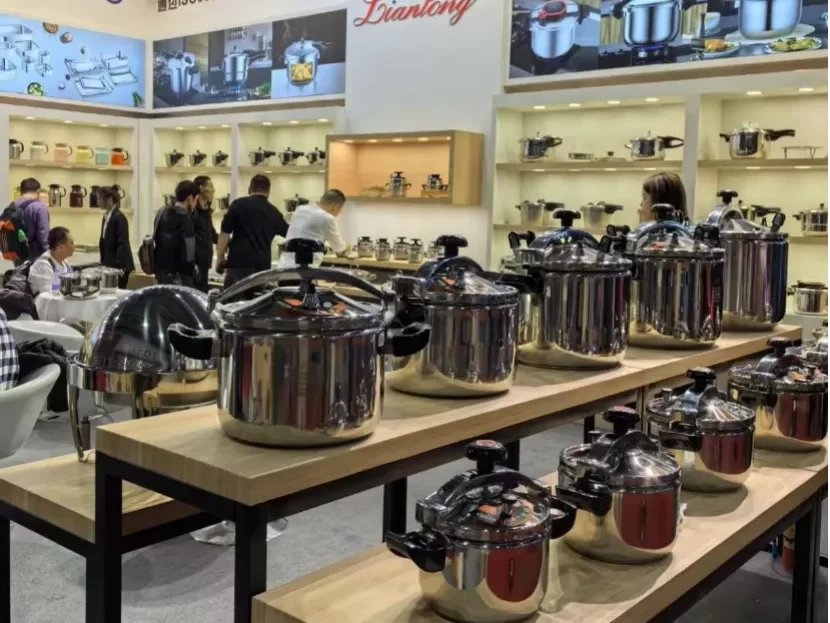
Balancing safety, health, and cost-efficiency, stainless steel pressure cooker is a worthy long-term investment. Their robust design ensures effortless cooking while safeguarding family health.
As a pressure cooker manufacturer focusing on stainless steel craftsmanship for 27 years, Linkton has passed ISO, SGS certification and provides high-quality stainless steel pressure cooker wholesale and customized services. We are committed to providing the best services and solutions to global dealers, retailers, etc. If you want to know more about our products and solutions, please contact us.

